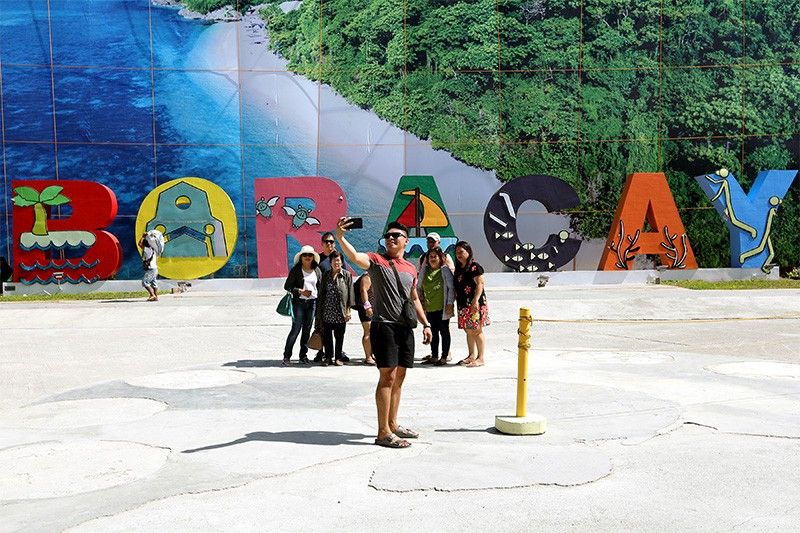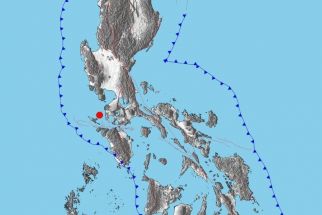In need of lifeline, millions of tourism industry workers rely on Bayanihan 2’s pledge for pandemic financial aid

MANILA, Philippines — Before the national government implemented a lockdown in a bid to curb the coronavirus spread in the country, Denzel Sarmiento, a foreign language guide for Spanish speaking guests, was booked with assignments.
Making the ends meet
However, with a travel ban on both local and international tourists in place, Sarmiento had to make ends meet.
“Literally zero. So, I have to find ways to make a living,” the tour guide of four years now, said in an e-mail interview with Philstar.com.
“Since bookings are canceled, work was placed on hold. No other options but to cancel reservations,” he added.
In view of this, Sarmiento was forced to temporarily shift to a different field of work. He temporarily worked for a business process outsourcing firm during the enhanced community quarantine period.
Like Sarmiento, Floriv Villalobos, a travel agency owner in El Nido, Palawan, was also forced to find ways on how to help his staff continue earning amid the global health crisis.
“As [a] boat owner and operator in El Nido, we don’t have lay-off. I used my savings to give salary from March to June, after June they can utilize the boat for fishing so they can earn,” he told Philstar.com.
Villalobos’ travel agency called BYHR Travel Services has 13 other staff members including three tour guides, four boat crew, three boat captains, one dispatcher/supervisor in El Nido and two sales representatives in Manila.
He shared that before the pandemic, 10% of their net income goes to the charity work of the non-government organization he founded, called Byahero Foundation.
No work, no pay
While Sarmiento and Villalobos were lucky to have found other means of income stream, tourism workers like Mike Aedorson Suarez, 25, faced the challenge of no work, no pay with the country being on lockdown for more than 150 days now.
During the first months of the ECQ from March to April, Suarez, who works as a server at an in-room dining service at a luxurious hotel in Pasay City, have been receiving full salary. But since May, the hotel implemented a no work, no pay scheme and he was only given a minimum work assignment during the quarantine period.
Philippine Airline Express Cabin crew worker Lucille Gokotano, who used to take on all domestic and regional flights including China, likewise experienced pay cut during the lockdown period.
“’Di na po same ang natatanggap namin na salary… ‘yung naiwan na lang na sick leaves kino-convert nila into cash and credit nila sa account namin,” the flight attendant said, adding that flying time was also shortened.
(We no longer receive the same salary as before… the sick leaves left are being converted into cash and credited to our accounts)
In her case, the carrier has implemented a no flight, less pay or no pay scheme.
Manu del Rosario, an entrepreneur, a seasoned tour guides and tourism trainer, also said his travel agency last June started to implement a no work, no pay scheme to their staff.
“Fortunate for us to receive the SSS grant that until May, our office staffs were able to receive this grant which became part of their compensation. Come June until now, our staffs are under a no work no pay scheme. No lay off hence we informed our staffs that 6 months is the maximum temporary closure of the operations of the business,” he told Philstar.com.
A collective battle cry
These workers are just a small fraction of the estimated 4.8 million formal and informal tourism industry workers who have been affected by the various levels of community quarantines in the Philippines.
The tourism industry employs 5.7 million people in 2019 and in the same year contributed 12.7% to the country’s overall gross domestic product.
Their financial struggles are among the reasons why they are calling on the Congress to restore the P10-billion financial assistance.
“We, the stakeholders still have a collective battle cry to allocate the fund for immediate financial assistance,” Del Rosario said.
“With the ongoing operating expenses with no income coming in, the stakeholders and businesses will all die soon. Some already closed down, some shifted to residential office space just what I did with my business, some chose to lay off their employees and some started to shift as well in online selling. The Congress should understand what is happening on ground. We are all going to die soon if no financial assistance will be granted,” he added.
Del Rosario said that some of them have already received cancellations of work since the Taal eruption in January.
Bayanihan 2
Last week, the House of Representatives approved on third and final reading its version of the proposed Bayanihan to Recover as One Act, or “Bayanihan 2,” which seeks to cushion the economic impact of COVID-19 pandemic.
The House Bill No. 6593 version, however, realigned the P10 billion fund to the infrastructure programs of the Tourism Infrastructure and Enterprise Zone Authority, which was initially allocated for the working capital loans of the tourism industry. It also approved another P100 million for training and subsidies to tourist groups.
Late July, its counterpart at the Senate, Senate Bill No. 1564 approved on third and final reading allocates the P10 billion stimulus package for the tourism industry.
Both bills were titled “An Act Providing for COVID-19 Response and Recovery Interventions and Providing Mechanism to Accelerate Recovery and Bolster the Resiliency of the Philippine Economy, Providing Funds therefor, and for other purposes.”
The Bicameral Committee has since deliberated on the provisions of the proposed Bayanihan 2 and is set to ratify its final version on Thursday.
More than 50 national and regional associations representing various tourism sectors, including the Tourism Congress of the Philippines, have reiterated their call on the government and lawmakers to provide the P10 billion rescue package that the Senate version of the Bayanihan 2 bill has provided.
They are once again seeking to reconsider the plight of the tourism workers citing that the intent of the legislation is to provide emergency relief and stimulus to restart the economy.
“Travel restrictions for most of the first half of this year have pushed us to the brink of bankruptcy and will surely nudge us over the edge in the coming weeks with no intervention by the government,” the joint statement of the tourism industry read.
The group is comprised of small tour operators, travel agencies, transport operators, resorts and hotels, restaurants, dive shops, suppliers and service providers employing the drivers, waiters, booking agents, tour guides, dive masters and other workers who were severely affected by the pandemic.
At least 70% of the industry are considered micro and small players of the industry. The Philippine Statistics Authority’s data showed that 99.9% of the 144,640 establishments in accommodation and food and service activities are also considered MSMEs.
They clarified that they are only seeking credit facilities to be administered by the government financing institutions like the Development Bank of the Philippines and the Land Bank of the Philippines, to provide them with loans.
“The funds will help us rehabilitate our facilities and upgrade our businesses to conform with the current health and safety standards set by the authorities and more importantly, help our employees financially,” the joint statement read.
“We committed to paying these emergency loans as tourism restarts domestically and globally,” it added.
Tourism Secretary Bernadette Romulo-Puyat, for her part, last week also backed these calls and stressed the industry’s need for working capital loans and not infrastructures.
The Department of Tourism is proposing that P9.5 billion of the P10 billion should be allocated to finance its programs and fund the critically impacted businesses while P500 million will go to various support programs “that would further aid the industry toward the new normal.”
Setting priorities
Last week, the tourism industry also issued a joint statement, citing that they agree with the significance of infrastructure development, however, they stressed that there are more urgent matters.
“We sincerely believe that the tourism infrastructure program envisioned by the House version of Bayanihan 2, while necessary in the long run for the recovery of the tourism industry, will not provide us with the relief that the industry urgently needs now,” it reiterated in its joint statement on Wednesday.
Mixed reactions
For Marielle Barraza, general manager of travel company Aisela Travel, the country may be lagging in terms of infrastructure, but providing the big amount to TIEZA doesn’t address the urgent need of the tourism industry which are the financial aids and jobs.
“We can have a certain allocation to the infrastructure since it can be a contribution to the improvement of our services since we know that we are lagging behind other Asian countries, but not the priority as of the moment,” she told Philstar.com.
Travel agency owner Villalobos, on the other hand, wants the Department of Trade and Industry to handle the P10-billion budget. He cited that the DTI is more accessible as some of the local tourism office rely on LGU while the DTI has centralized organizations.
The DOT, however, has designated regional offices across the country.
What TIEZA said
In a letter addressed to House Speaker Alan Peter Cayetano dated August 11, TIEZA chief operating officer Pocholo Paragas appealed to the lawmakers to prioritize the financial support and assistance to our tourism workers
“Without the direct financial support from the government, the tourism micro, small and medium-scale enterprises cannot rebuild their businesses and pay for the salaries of their workers,” he wrote.
A number of lawmakers, including Reps. Ruffy Biazon (Muntinlupa) and Rufus Rodriguez (Cagayan de Oro City, 2nd District), have also urged the bicameral panel to adopt the Senate version of the provision on relief for tourism stakeholders.
I hope the Bayanihan 2 Bicam will decide to adopt the Senate version of the provision on support for Tourism. I don’t agree with the infusion of 10B to TIEZA at this time. Perhaps later. For now, industry players survival is more essential.
— Ruffy Biazon (@ruffybiazon) August 19, 2020
‘Recipe for stealing?’
Foreign Affairs Secretary Teodoro Locsin Jr., who also expressed support for the P10-billion aid, echoed the statement and said that "putting it in infrastructure is a recipe for stealing.
Rep. Lito Atienza (Buhay party-list) likewise reportedly likened the diverted fund to the reallocation of pork barrel.
“Infrastructure is the new word for pork barrel. It’s very callous of a group of congressmen to remove the fund meant to help (tourism) businesses and provide employment (amid the pandemic),” Atienza was quoted as saying in a phone interview of The STAR and One News.
The bicameral committee has proposed a P166.5-billion Bayanihan 2 fund to address the COVID-19 pandemic which is higher than the House and Senate’s proposed budget of P162 billion and P140 billion, respectively.
On the other hand, the fist Bayanihan To Heal as One Act or the Republic Act 11469 signed into law in March granted President Rodrigo Duterte P275-billion worth of public funds which will used for the COVID-19 response efforts for three months. The validity of this, however, expired in June.
- Latest
- Trending





























